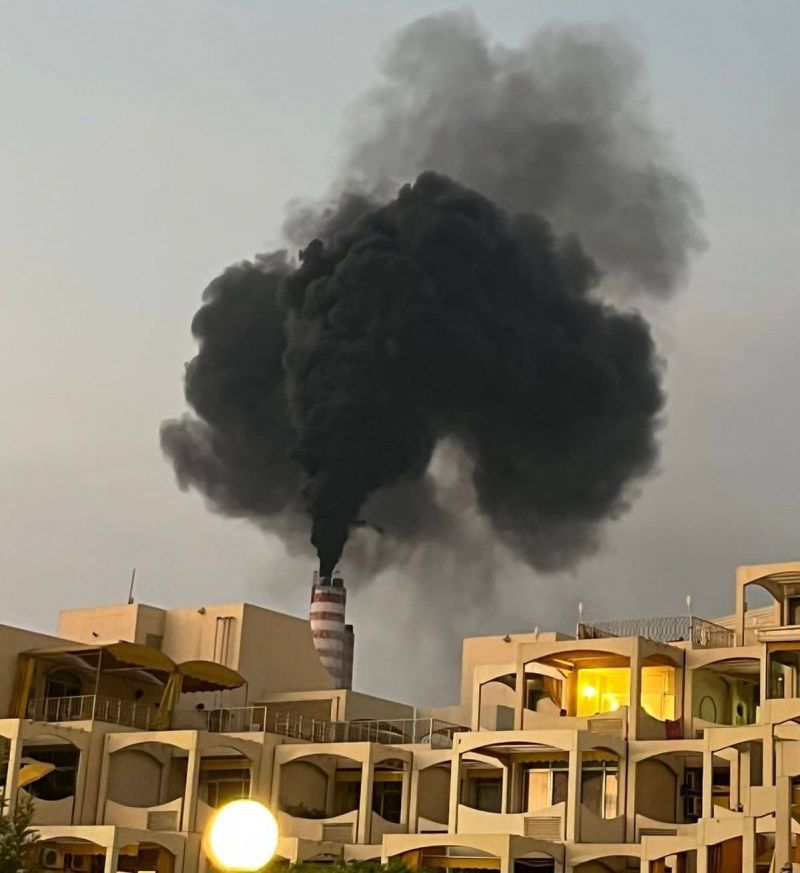
A thick cloud of black smoke emerges from the Zouk power plant. (Image circulated on social media)
Want to get the Morning Brief by email? Click here to sign up.
Relatives of migrants stranded aboard a boat off the Maltese and Greek coasts since Saturday blocked a road in Akkar yesterday, North Lebanon to protest Greek authorities’ inaction while their families are at risk of dying of thirst, hunger or drowning. The protesters, according to L’Orient Today’s correspondent in the area, claimed that the boat, having run out of fuel, was at risk of sinking after food and water supplies were reportedly depleted Monday. The stranded migrants’ relatives said they would protest at the Greek embassy in Beirut if Hellenic authorities remain inept. Tripoli MP Ashraf Rifi on Sunday had called on Italian authorities and Lebanese diplomatic missions in Italy to intervene. At least 60 people, including Lebanese, Syrian and Palestinian nationals, boarded the smuggler boat Saturday “to seek a decent life for themselves and their families,” according to Abou Ayman al-Moshmshani, a Lebanese man who said his children and grandchildren are trapped at sea. Irregular migration attempts have proliferated in Lebanon as the economic crisis imposes increasingly strenuous living conditions on the country’s inhabitants. In April, around 30 passengers who were aboard a boat destined for Europe disappeared after their vessel sank off the coast of Tripoli following an encounter with the Lebanese Army. A submarine crew tasked with finding the would-be migrants’ remains left Lebanon without making any official statement on Aug. 31, after locating 11 bodies over the course of their mission.
A thick black plume of smoke was seen yesterday coming from the Zouk Power Plant. Many took to social media to share their outrage at the smoke and pollution caused in the air. Journalist Bassam Abou Zeid tweeted that the factory should be stopped immediately as fumes said to be cancerous spread in the area and towards neighboring regions. There have been numerous studies on the disastrous impact of Zouk's power plant, which releases toxic emissions including sulfur dioxide and carbon monoxide, and has been shown to cause higher rates of lung cancer and pulmonary and cardiovascular disease among those residing near the power plant. Debt related to Lebanon’s energy and electricity sector represents more than 40 percent of its sovereign debt, while residents of Lebanon endure less than two hours of electricity from Electricité du Liban (EDL).
While state telecom provider Ogero’s employees remain on strike, malfunctions in its network caused a brief “forced outage” of mobile operator Alfa’s services yesterday, with residents of Batroun claiming it “isolated” parts of the city. The interruption to Alfa’s services was incurred by fuel shortages at the Sin al-Fil central telecom station, through which telecom providers Alfa and Touch’s optical cables run. A similar issue prompted Batroun residents to call on employees to refuel their region’s telecom centers. Striking employees on Monday announced they would provide 21 centers with fuel after caretaker Telecoms Minister Johnny Corm signed decrees meeting part of their demands. However, workers said the open-ended strike, which demands improved compensation and has been ongoing since last Monday, would persist until employees receive a salary modification. Corm had requested a treasury advance that “covers expenses that are the right of the employees,” which is currently pending, awaiting the signatures of caretaker Prime Minister Najib Mikati and caretaker Finance Minister Youssef Khalil. On Monday, caretaker Education Minister Abbas Halabi deemed public school teachers’ demand for a salary increase matching the parallel lira to dollar market rate – a claim resembling that made by Ogero employees – was “not possible, because [employees] of other public sectors like judges, security forces, administration workers and others will demand the same thing.” Over the past week, telephone and internet outages were noted in several areas, interrupting crucial services such as the Red Cross hotline in South Lebanon.
An armed gang allegedly attempted to rob three money exchangers, reportedly killing one and injuring another, on a road between the villages of Makneh and Younin in the Bekaa Valley. A car pursuit, in which the gang allegedly tailed the exchangers, escalated when members of the armed group opened fire on their targets, L’Orient Today’s correspondent in the area reported. The injured exchanger was transferred to a nearby hospital while the Lebanese Army was deployed at the scene, locating the attackers’ alleged vehicle in Makneh after it had been burnt. The onset of the crisis has jeopardized security in Lebanon as the impoverished state struggles to subdue crime, notably in areas such as the Bekaa Valley where weapons have circulated. A report published in August by Beirut-based research center Information International showed a surge in reported murders, while theft crimes had decreased compared to the same period the previous year.
Caretaker Public Health Minister Firas Abiad decreed on Monday hospitals not turn away patients before guaranteeing their admission to another medical institution and that their medical status permits transportation. Abiad said that numerous patients who had been turned away from hospitals due to their inability to cover medical expenses had died while being transported. Hospitals must now coordinate the transfer of emergency room patients with the Health Ministry, Abiad added. The decree follows other reforms at the Health Ministry, preceded by the launch of a medicine tracking platform, as the medical sector suffers amid the economic crisis which forced a significant number of medical professionals to emigrate.
In case you missed it, here’s our must-read story from yesterday: “Five months since its preliminary agreement with the IMF, Lebanon has little to show for it.”
Compiled by Abbas Mahfouz